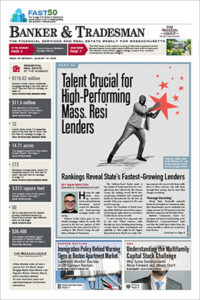A prominent think tank and two major business groups have teamed up to create a new lobby group that says it’s “aimed at promoting opportunity and improving competitiveness” in Massachusetts.
The Mass Opportunity Alliance, or MOA, is the joint work of the Massachusetts High Technology Council, the Massachusetts Competitive Partnership and the Pioneer Institute and claims as its members the Massachusetts Restaurant Association, the National Federation of Independent Business and the Retailers Association of Massachusetts.
The High Tech Council represents the state’s major software and tech businesses and the Competitive Partnership was founded in 2010 with a similar mission to MOA and is focused on convening CEOs of the state’s largest businesses to lobby for government policy changes.
In its launch announcement, MOA said it was a reaction to “the weakening business environment in Massachusetts, as well as the state’s rising cost of living and outmigration trends” and signaled its intent to push back against progressive policies like higher corporate and personal income taxes as well as publish research to support its policy priorities.
“The Mass Opportunity Alliance is a first for Massachusetts, uniting leaders and organizations across the Commonwealth to safeguard our strengths and address mounting competitiveness challenges,” Christopher R. Anderson, president of the Massachusetts High Technology Council, said in a statement. “Amid concerning trends like outmigration, a weakening business climate, and a rising cost of living, MOA will actively engage the public, businesses, nonprofit leaders, and policymakers to promote solutions that strengthen the Commonwealth’s economy. A strong business climate is critical to sustaining economic growth, promoting social mobility, and enhancing quality of life for all Massachusetts residents.”
Even before the Fair Share Amendment ballot measure, also called the “Millionaires Tax,” passed in 2022, many top business leaders have chafed at what they see as policies like that surtax on income over $1 million that make it harder to recruit talent or keep businesses in the face of competition from low-tax, low cost-of-living states like Florida and Texas. And while Gov. Maura Healey has made the state’s economic competitiveness and tax burden a major focus of her administration alongside lowering the cost of housing, some business leaders have privately criticized groups like the Massachusetts Competitive Partnership for a lack of effectiveness in the face of influential progressive political factions in state and local politics.
The pro-business Tax Foundation recently ranked Massachusetts as 46th in the nation for the complexity of its tax system and the burden it places on businesses and personal income. And dueling business-backed and progressive-backed reports issued in recent days are trying to define the ongoing debate about the state’s problems, with business forces arguing for a focus on deregulation and lower taxes on the wealthy and progressive forces saying lowering the cost of housing and childcare are the main reasons driving residents from Massachusetts.
It’s not clear the MOA has unanimous support from business leaders just yet, though. In an interview with The Boston Globe, Greater Boston Chamber of Commerce CEO Jim Rooney questioned whether it was “a good thing for the business community to have so many different voices.”







